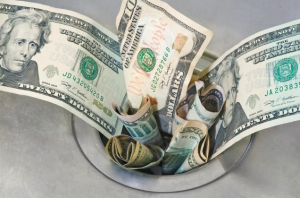Understand Depreciating Assets to Maintain Your Financial Security

If you’ve just won the lottery, there’s a huge temptation to buy stuff – sometimes a lot of stuff. And when it comes to purchases, there are a lot of options, from cars to boats and houses to jewelry. It may be tempting to start buying everything immediately but you should resist the urge. Before any extravagant purchases, you’ll want to take care of the essentials, like getting your finances squared away and paying off credit card debt, medical bills, and mortgages while setting aside some money for your long-term savings and an emergency fund.
After squaring away the basics, you’ll likely still have the urge to spend big – but you should still choose carefully. There’s nothing wrong with spending money (even a lot of money) if you spend it on the right things. But what are the right things? Well, that depends, but smart buying choices usually involve purchasing appreciating assets (ones that gain in value), while avoiding buying many depreciating assets (ones that decline in value). Know the difference, and you’ll be able to spend with confidence.
Many lottery winners feel the urge to begin purchasing expensive cars shortly after their win, but some regret it later. This is because most new cars depreciate extremely quickly; in fact, some very expensive cars lose $10,000, $20,000, or even $50,000 in value simply because they have been driven off the dealer’s lot. Worse, however, are even less re-sellable items such as clothes and shoes, which often lose an incredible amount of value upon their first wear, unless of course they are a highly in-demand item (e.g., the infamous Birkin bag).
Despite the fast depreciation of cars, clothes, and shoes, boats can pose an even bigger threat to a recent lottery winner’s wallet. While boating can be an amazing experience, full-time boat ownership can be an expensive proposition and it certainly isn’t for everyone. Keeping a boat in the water requires continuous maintenance and cleaning, while dry docking can be an expensive proposition. If a boat is big enough, it will need its own staff, which is hardly a reasonable investment for all but the wealthiest lotto winners.
While most new cars, boats, clothes, and shoes are depreciating assets, that’s not always the case with collectibles and vintage items. However, that doesn’t necessarily give free license to go out and buy something expensive just because it’s old. Instead, smart lottery winners appreciate the fact that if they want to buy a vintage item as an investment they’ll have to do serious research first for a good chance of making a return (or even getting the money back).
Well-informed lottery winners also appreciate the fact that they’re taking on some liquidity risk by investing in collectible items – because while an item might appreciate, it might be hard to sell quickly, especially at the price you want. That illiquidity means that you might not be able to access the value in your investment for quite a while. Therefore, unless you happen to be a lottery winning antiques dealer, you probably shouldn’t invest too much of your lottery winnings in collectible items, no matter how much they might appreciate.
When you’re going for a big purchase, try to spend it on a home (or homes), especially if the real estate market is somewhat down. Of all the physical items the average lottery winner could invest in, real estate probably has the most likelihood of retaining its value and offering a significant return over time.
While you may not be able to ‘cash out’ the equity in your home immediately, if you purchase a nice home in a desirable area, it shouldn’t be too hard to sell. Plus, if you need emergency cash later, you can always take out a home equity loan on the property, paying it off when the property sells. As long as you pay enough cash up front and don’t burden yourself with huge mortgage payments, you could increase your cashflow by renting additional properties out, as long as you’re up for being a landlord (or paying someone to manage the properties).
Lottery winners should make a budget for the essentials, set aside a little ‘fun money,’ and save (or invest) the rest in appreciating assets to keep your windfall secure. You don’t have to track every single cent just to ensure your long-term financial stability but you still need to make a sensible plan. First make sure to take care of impending debts and other important costs. Then, make a budget of how much you will need to spend on bills and essentials each month and year, making sure to set aside enough for the next 5-10 years (depending on the size of your lottery winnings).
Once that’s out of the way, set aside 10-20% of your remaining winnings into a ‘fun account,’ with which you can do whatever you want. The rest, ideally, should be saved and carefully invested in appreciating assets, including stocks, mutual funds, and bonds, that may be able to offer a good return over time at a reasonable amount of risk. No matter what you decide to buy with your lottery money, always do your research first and remember to avoid spending too much on depreciating assets. Over time, you’ll be thankful you did – or didn’t.
To learn more about how to protect your financial stability after winning the lottery or to set up a custom disbursement that meets your financial needs, contact NuPoint Funding today at 1.877.635.3149 or through our ONLINE FORM for a free consultation.